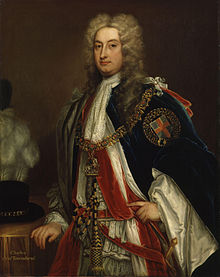Turnip Townshend
|
The Right Honourable The Viscount Townshend KG, PC, FRS |
|
|---|---|

Charles, Viscount Townshend, after Kneller c. 1715–20. Dressed in Garter robes (National Portrait Gallery)
|
|
| Lord President of the Council | |
|
In office 11 June 1720 – 25 June 1721 |
|
| Monarch | George I |
| Preceded by | The Duke of Kingston-upon-Hull |
| Succeeded by | The Lord Carleton |
| Personal details | |
| Born |
18 April 1674 Raynham Hall, Norfolk, Kingdom of England |
| Died | 21 June 1738 (aged 64) Raynham Hall, Norfolk, England, Kingdom of Great Britain |
| Nationality | English |
| Parents | Horatio Townshend (father) |
| Known for | inventing the 4 crop rotation method |
Charles Townshend, 2nd Viscount Townshend, KG, PC, FRS (/ˈtaʊnzənd/; 18 April 1674 – 21 June 1738) was an English Whig statesman. He served for a decade as Secretary of State for the Northern Department, 1714–1717, 1721–1730. He directed British foreign policy in close collaboration with his brother-in-law, prime minister Robert Walpole. He was often known as Turnip Townshend because of his strong interest in farming turnips and his role in the British Agricultural Revolution.
Townshend was the eldest son of Sir Horatio Townshend, 3rd Baronet, who was created Baron Townshend in 1661 and Viscount Townshend in 1682. The old Norfolk family of Townshend, to which he belonged, is descended from Sir Roger Townshend (d. 1493) of Raynham, who acted as legal advisor to the Paston family, and was made a justice of the common pleas in 1484. His descendant, another Sir Roger Townshend Townshend.
Born at Raynham Hall, Norfolk, Townshend succeeded to the peerages in December 1687, and was educated at Eton College and King's College, Cambridge. He had Tory sympathies when he took his seat in the House of Lords, but his views changed, and he began to take an active part in politics as a Whig. For a few years after the accession of Queen Anne he remained without office, but in November 1708 he was appointed Captain of the Yeomen of the Guard, having in the previous year been summoned to the Privy Council. He was ambassador extraordinary and plenipotentiary to the States-General from 1709 to 1711, taking part during these years in the negotiations which preceded the conclusion of the Treaty of Utrecht.
...
Wikipedia
